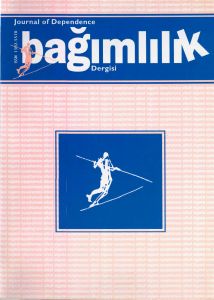Alkol bağımlısı hastalarda gözlem altında disulfiram tedavisi
Anahtar Kelimeler:
Disulfiram- alkol bağımlılığı- bağımlılık tedavisiÖz
Amaç: Alkol bağımlılığında disulfiram tedavisinin en önemli zorluğu hastaların kendi başlarına bırakıldıklarında ilacı almayı bir süre sonra terk etmeleridir. Bu çalışmada gözlem altında disulfiram verilen hastaların tedaviye uyumları ve içmeme sürelerinin gözlemlenmesi amaçlandı.
Yöntem: Alkol bağımlısı 38 hastaya bir yakınının gözlemi altında 500 mg/gün disulfiram almaları önerildi. Tedaviye uyum ve içmeme süreleri izlendi.
Bulgular: Çalışmaya alınan 27 hasta disulfiram kullanmayı kabul ettikten sonra tedaviye devam etmiştir. Bu hastaların, disulfiram başlandıktan sonra takibe devam ortalaması 109 gündü (min: 20 gün, max: 1 yıl). Onbir hasta disulfiram kullanırken alkol almayı denediğini bildirdi. Bir hastada disulfiram alırken tekrarlayıcı bir şekilde alkol aldığı için disulfiram kesildi. Beş hastada gelişen organik beyin sendromu ve 2 hastada gelişen kas güçsüzlüğü disulfirama bağlanarak tedavi sonlandırıldı. Yan etki nedeniyle disulfiram tedavisi sonlandırılan hastaların üçünde tablo düzeldikten sonra disulfiram, daha düşük dozda (250 mg/gün) yeniden başlandı. Dokuz hasta disulfiramı önerildiği şekilde ve düzenli olarak kullandı. Bu hastalarda ortalama 6 ay içmeme sağlandı (min: 2 ay, max: 12 ay).
Sonuç: Bu bulgular süpervizyon altında disulfiram kullanımının uygun alkol bağımlısı hastaları için tedavi seçenekleri arasında yer alması gerektiğini düşündürmektedir.
Referanslar
Fuller RK, Branchey L, Brightwell DR, et al. Disulfiram treatment of alcoholism. A Veterans Administration cooperative study. JAMA 1986; 256:1449-1455.
Azrin NH, Sisson RW, Meyers R, et al. Alcoholism treatment by disulfiram and community reinforcement therapy. J Behav Ther Exp Psychiatry 1982; 13:105112.
Sereny G, Sharma V, Holt J, et al. Mandatory supervised antabuse therapy in an outpatient alcoholism program: a pilot study. Alcohol Clin Exp Res 1986; 10:290-292.
Hughes JC, Cook CC. The efficacy of disulfiram: a review of outcome studies. Addiction 1997; 92:381-395.
Chick J, Gough K, Falkowski W, et al. Disulfiram treatment of alcoholism. Br J Psychiatry 1992; 161:84-89.
Azrin NH. Improvements in the community-reinforcement approach to alcoholism. Behav Res Ther 1976; 14: 339-348.
Gerrein JR, Rosenberg CM, Manohar V. Disulfiram maintenance in outpatient treatment of alcoholism. Arch Gen Psych 1973; 28: 798- 802.
O’Farrell TJ, Bayog RD. Antabuse contracts for married alcoholics and their spouses: a method to maintain antabuse ingestion and decrease conflict about drinking. J Subst Abuse Treat 1986; 3: 1-8.
Brewer C. Controlled trials of Antabuse in alcoholism: the importance of supervision and adequate dosage. Acta Psychiatr Scand Suppl 1992; 369: 51-58.
Brewer C, Smith J. Probation linked supervised disulfiram in the treatment of habitual drunken offenders: results of a pilot study. BMJ 1983; 287: 1282-1283.
Banys P. The clinical use of disulfiram (Antabuse): a review. J Psychoactive Drugs 1988; 20: 243-261.
Lundwall L, Baekeland F. Disulfiram treatment of alcoholism: a review. J Nerv Ment Dis 1971; 153: 381-394.
Brewer C. Patterns of compliance and evasion in treatment programmes which include supervised disulfiram. Alcohol Alcohol 1986; 21: 385-388.
İndir
Yayınlanmış
Sayı
Bölüm
Lisans
Telif Hakkı (c) 2025 Bağımlılık Dergisi

Bu çalışma Creative Commons Attribution-NonCommercial-NoDerivatives 4.0 International License ile lisanslanmıştır.
Dergimiz ve bu internet sitesinin tüm içeriği Creative Commons Atıf-GayriTicari-Türetilemez 4.0 Uluslararası (CC BY-NC-ND 4.0) lisansının şartları ile ruhsatlandırılmıştır. Bu durum, Budapeşte açık erişim girişiminin (BOAI) açık erişim tanımı ile uyumludur. Creative Commons Atıf-GayriTicari-Türetilemez Lisansı, kullanıcıların bir makaleyi kopyalamasına, değiştirmeden dağıtmasına ve nakletmesine ve makalenin ticari olmayan mahiyette kullanılmasına imkan tanımaktadır. CC BY-NC-ND 4.0 lisansı, yazarına uygun şekilde atfedildiği sürece açık erişimli bir makalenin ticari olmayan mahiyette kullanılmasına izin vermektedir.

